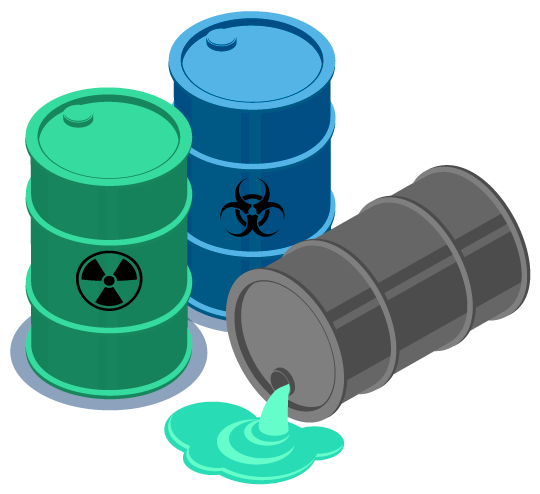Exactly How Liquid Waste Disposal Functions: A Thorough Review of Methods and Technologies Utilized

Summary of Liquid Waste Types
The complexity of fluid waste types demands a thorough understanding of their qualities and ramifications for disposal. Liquid waste can generally be classified right into several kinds, including commercial, local, farming, and hazardous waste. Each category exhibits distinct homes, needing details monitoring techniques to minimize ecological and health and wellness threats.
Industrial fluid waste originates from making processes and typically contains a variety of contaminants, such as heavy metals, solvents, and organic compounds. Community fluid waste, largely comprising wastewater from houses and industrial facilities, includes natural issue, nutrients, and virus (industrial wastewater treatment). Agricultural fluid waste, including drainage from farms, might have fertilizers, pesticides, and animal waste, presenting dangers to water top quality and environments
Hazardous liquid waste is identified by its toxicity, reactivity, or possible to trigger damage. Understanding these varied liquid waste types is vital for developing reliable disposal methods and guaranteeing conformity with ecological regulations.
Physical Therapy Approaches

Screening is the preliminary action, where larger fragments and particles are eliminated from the liquid waste utilizing screens or grates. In sedimentation storage tanks, much heavier particles clear up at the base, forming a sludge layer, while the clarified liquid can be further treated.
Filtering is another vital method that includes passing the fluid via permeable materials, such as sand or membrane layers, to capture smaller particles. This step improves the top quality of the liquid, making it suitable for succeeding therapy procedures.

Chemical Treatment Methods
Chemical treatment methods are crucial for effectively managing fluid waste, specifically in resolving dissolved and colloidal pollutants that physical approaches may not sufficiently eliminate. These methods use various chemical representatives to counteract, speed up, or transform harmful substances into less harmful types.
One typical approach is coagulation and flocculation, where chemicals such as alum or ferric chloride are included to advertise the aggregation of put on hold particles. This procedure enhances sedimentation, permitting much easier helpful hints removal of the resulting sludge. Additionally, oxidation procedures, using representatives like chlorine or ozone, are employed to damage down intricate natural substances and microorganisms, making the waste safer for discharge or further treatment.
Neutralization is one more important strategy, which adjusts the pH of acidic or alkaline waste streams to neutral degrees, preventing possible harm to downstream systems and the environment. In addition, advanced oxidation processes (AOPs) use mixes of oxidants and ultraviolet light to break down persistent toxins, attaining a higher degree of therapy effectiveness.
Organic Treatment Procedures
Biological treatment procedures play an important role in the monitoring of fluid waste by utilizing bacteria to decay organic issue and reduce pollutant levels. These procedures can be broadly categorized right into anaerobic and aerobic treatments, each employing certain microbial areas to accomplish reliable waste degradation.
Cardiovascular therapy involves using oxygen to facilitate the malfunction of natural products by microorganisms. This procedure is commonly carried out in triggered sludge systems, where aeration containers provide a helpful atmosphere for microbial development, leading to the oxidation of natural pollutants. The resultant biomass can be divided from dealt with effluent via sedimentation.
On the other hand, anaerobic therapy occurs in the lack of oxygen, depending on different germs to damage down raw material. This method is specifically advantageous for high-strength waste, as it creates biogas, a renewable resource resource, while reducing sludge manufacturing. Technologies such as anaerobic digesters are often employed in metropolitan and industrial applications.
Both cardiovascular and anaerobic organic therapies not only decrease the environmental effect of liquid waste but additionally promote source recuperation, making them essential elements of lasting waste monitoring methods. Their performance, performance, and versatility sustain their extensive execution across various fields.
Emerging Technologies in Disposal
Ingenious approaches to liquid waste disposal are swiftly developing, driven by innovations in technology and a raising emphasis on sustainability. Among these arising modern technologies, membrane bioreactors (MBRs) have obtained traction for their capacity to combine biological therapy with membrane purification, resulting in high-grade effluent that can be recycled in different applications. MBRs make it possible for smaller footprints and more reliable operations compared to traditional systems.
Another encouraging growth is using anaerobic digestion incorporated with nutrient recuperation innovations, which not only deals with liquid waste but likewise creates biogas and recuperates beneficial nutrients like nitrogen and phosphorus. This dual advantage boosts source effectiveness and minimizes environmental impact.
In addition, advanced oxidation processes (AOPs) are being embraced for the destruction of complicated natural contaminants. These methods make use of powerful oxidants and drivers to break down pollutants at the molecular degree, using click here now a very efficient remedy for challenging waste streams.
Furthermore, the integration of artificial intelligence and artificial intelligence in waste management systems is maximizing functional efficiency and anticipating upkeep, resulting in lowered costs and improved environmental conformity. These modern technologies show a significant change in the direction of more effective and sustainable fluid waste disposal techniques.
Final Thought
In verdict, reliable liquid waste disposal demands a detailed understanding of different techniques and modern technologies. By constantly advancing these techniques, it ends up being feasible to resolve the growing obstacles associated with fluid waste, eventually adding to ecological protection and resource healing.
Liquid waste disposal is an essential aspect of environmental management, requiring an extensive understanding of numerous techniques and technologies tailored to different waste kinds. Fluid waste can generally be categorized into a number of kinds, consisting of industrial, browse around here metropolitan, farming, and dangerous waste. Agricultural fluid waste, consisting of drainage from ranches, might have plant foods, chemicals, and animal waste, posturing risks to water high quality and environments.
Numerous physical treatment methods play a crucial duty in handling fluid waste effectively - industrial wastewater treatment.In final thought, efficient fluid waste disposal necessitates a thorough understanding of numerous strategies and modern technologies